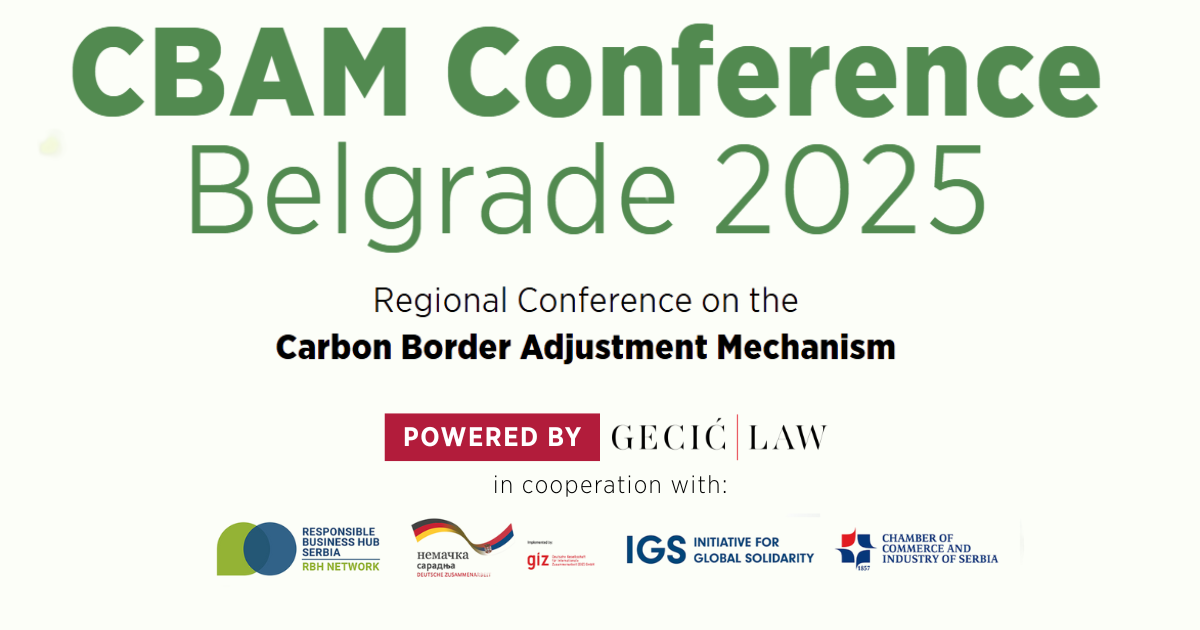

On June 12, 2025, Belgrade will host the Regional Conference on the Carbon Border Adjustment Mechanism (CBAM) – CBAM Belgrade 2025. Powered by Gecić Law, in cooperation with the Responsible Business Hub of the Chamber of Commerce of the Republic of Serbia, GIZ Serbia and the Initiative for Global Solidarity, this unique event brings together policymakers, industry leaders, legal experts, and sustainability professionals to delve into the European Union’s Carbon Border Adjustment Mechanism (CBAM) and its profound implications for the Western Balkans and beyond.
The EU’s CBAM regulation aims to level the playing field for EU industries. It does so by imposing a carbon price on imports of certain goods from non-EU countries. By doing so, it also seeks to prevent carbon leakage and encourage global partners to adopt greener practices. As CBAM enters its definitive phase in 2026, understanding its mechanisms undoubtedly becomes crucial for businesses and governments alike.
The conference agenda is designed to address the multifaceted aspects of CBAM:
Opening Session: Introductory addresses by Jagoda Lazarević, Serbia’s Minister for Domestic and Foreign Trade, Marko Čadež, President of the Chamber of Commerce and Industry of Serbia, Bogdan Gecić, Founding Partner at Gecić LAwand insights from Delphine Sallard of the European Commission’s DG TAXUD, setting the stage for further in-depth discussions.
Panel I – From Reporting to Reality: Exploring the Western Balkans’ position at the carbon border crossroads, this panel features experts like Till Müller-Ibold and Jovana Joksimović, discussing the region’s readiness and challenges in adapting to CBAM requirements.
Panel II – Sectoral Strategies: Moderated by Dr. Alan Riley, this session further examines CBAM’s ripple effects across various industries, with contributions from representatives of CarbonChain, the Energy Community Secretariat, and leading industrial firms.
Panel III – Negotiating the Carbon Border: Focusing on strategic approaches, this panel delves into the Western Balkans’ four-pillar plan and lessons from the UK’s experience, featuring insights from Anne MacGregor and other key stakeholders.
The Western Balkans, with economies closely tied to the EU, face both challenges and opportunities with CBAM’s implementation. The conference thus serves as a platform to:
Enhance Regional Preparedness: By bringing together regional leaders and experts, the event aims to foster a unified approach to CBAM compliance.
Promote Sustainable Practices: Discussions will highlight the importance of adopting greener technologies and practices to meet CBAM standards.
Strengthen EU Integration Efforts: Aligning with CBAM can serve as a stepping stone for deeper integration into EU markets and frameworks.
CBAM Belgrade 2025 therefore stands as a critical juncture for the Western Balkans to engage with the evolving landscape of EU’s climate and trade policy. By facilitating dialogue, sharing expertise, and fostering collaboration, the conference aims to equip the region with the tools and knowledge necessary to navigate the complexities of CBAM and be prepared.
For more information and to register, visit cbam.geciclaw.com.